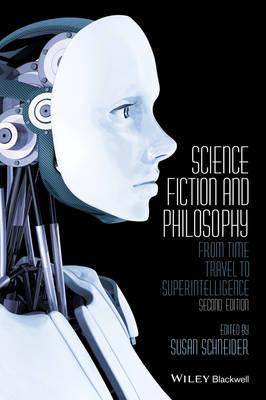Overview
Featuring numerous updates and enhancements, Science Fiction and Philosophy, 2nd Edition, presents a collection of readings that utilize concepts developed from science fiction to explore a variety of classic and contemporary philosophical issues. Uses science fiction to address a series of classic and contemporary philosophical issues, including many raised by recent scientific developments Explores questions relating to transhumanism, brain enhancement, time travel, the nature of the self, and the ethics of artificial intelligence Features numerous updates to the popular and highly acclaimed first edition, including new chapters addressing the cutting-edge topic of the technological singularity Draws on a broad range of science fiction’s more familiar novels, films, and TV series, including I, Robot, The Hunger Games, The Matrix, Star Trek, Blade Runner, and Brave New World Provides a gateway into classic philosophical puzzles and topics informed by the latest technology
Full Product Details
Author: Susan Schneider (University of Pennsylvania)
Publisher: John Wiley and Sons Ltd
Imprint: Wiley-Blackwell
Edition: 2nd edition
Dimensions:
Width: 15.20cm
, Height: 3.10cm
, Length: 22.60cm
Weight: 0.522kg
ISBN: 9781118922613
ISBN 10: 1118922611
Pages: 432
Publication Date: 23 February 2016
Audience:
General/trade
,
General
Format: Paperback
Publisher's Status: Active
Availability: Available To Order

We have confirmation that this item is in stock with the supplier. It will be ordered in for you and dispatched immediately.
Reviews
""Schneider's anthology, as it stands, is a great introduction to many of the fundamental theoretical issues raised by SF. Each topic is covered with a panel of accessible texts. One will also appreciate the presence of several short stories and references to related works of SF in every section of the book."" (Metapsychology online reviews 2016)
Schneider's anthology, as it stands, is a great introduction to many of the fundamental theoretical issues raised by SF. Each topic is covered with a panel of accessible texts. One will also appreciate the presence of several short stories and references to related works of SF in every section of the book. (Metapsychology online reviews 2016) What are consciousness and free will? Will artificial beings have them? Do we? And do we owe an ethical debt to future generations, even if they wear quite different bodies, or minds? These, and countless other questions first raised by a century's worth of canonical science fiction, are now ambitiously appraised by Susan Schneider in a volume that explores our philosophical frontier. David Brin, astrophysicist and Times best-selling author of The Postman and Earth Susan Schneider has assembled an incredibly wide range of stimulating and accessible thoughts in these pages. The second edition of Science Fiction and Philosophy will fascinate anyone who enjoys thinking 'outside of the box'Â though it might leave their minds in a whirl! Martin Rees, 'UK Astronomer Royal'
Schneider's anthology, as it stands, is a great introduction to many of the fundamental theoretical issues raised by SF. Each topic is covered with a panel of accessible texts. One will also appreciate the presence of several short stories and references to related works of SF in every section of the book. (Metapsychology online reviews 2016)
Author Information
Susan Schneider is a Philosophy Professor at the University of Connecticut and a Fellow with the American Council of Learned Societies. She is the author of The Language of Thought: a New Philosophical Direction (2011) and the co-author, with Max Velmans, of The Blackwell Companion to Consciousness (2006).




